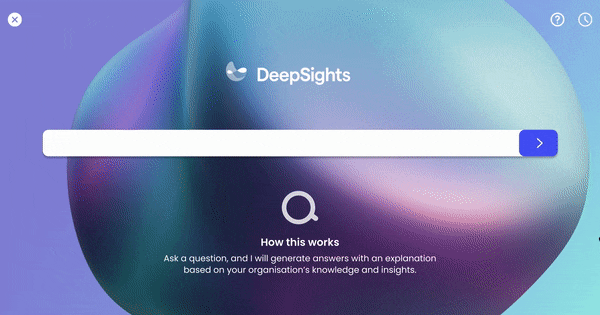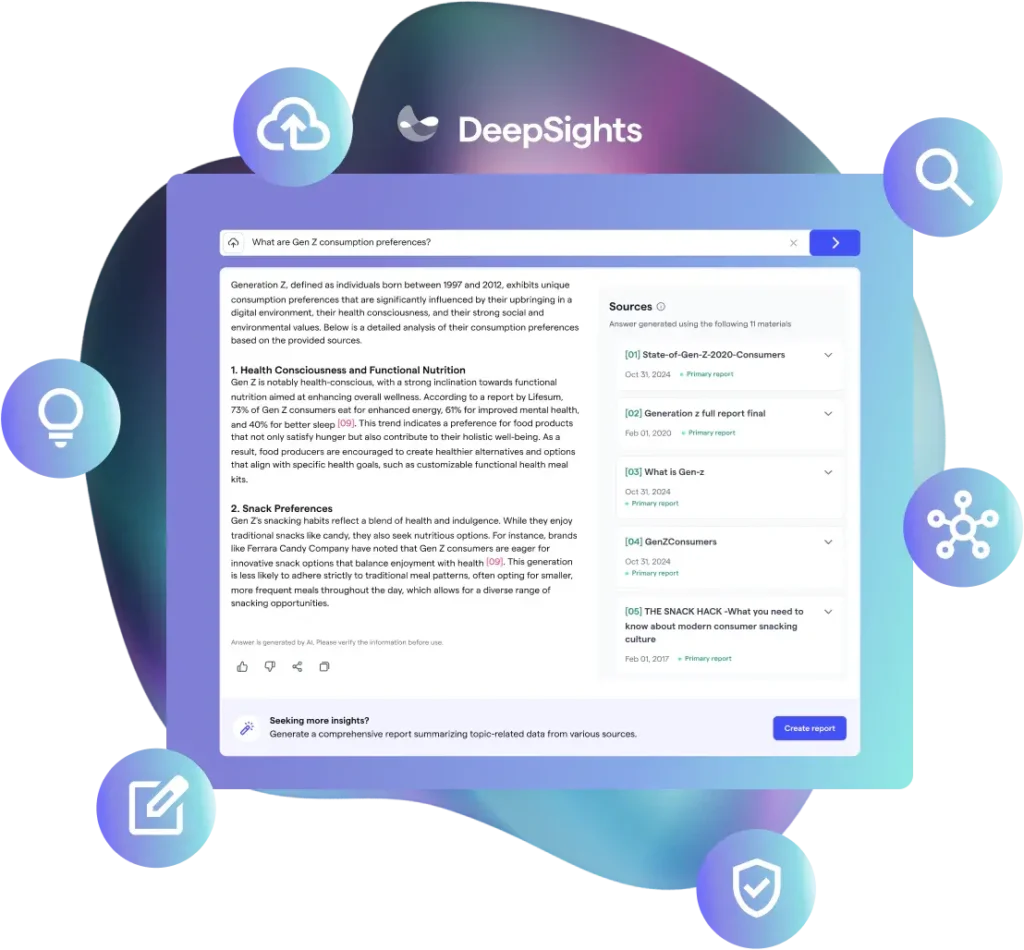For lean teams — be it in insights, business, or product functions — within enterprise organizations, agile innovation is a critical approach to maintaining competitive advantage. Agile innovation combines the iterative, collaborative principles of agile methodologies with strategic innovation processes to create responsive, market-aligned solutions. All these teams, operating with limited resources but high expectations, face unique challenges and opportunities.
Despite substantial investments in market research, many enterprises struggle to effectively utilize their knowledge repositories when operating with one or more lean teams. The vast amounts of collected data from market research often remain underutilized, creating a situation where these teams make ineffective decisions simply because they’re not leveraging valuable insights.
In this article, we’ll explore how lean teams can harness the power of focused insights from existing research investments to drive agile innovation processes, ultimately maintaining market success without additional resource expenditure.

The challenges lean teams face in maintaining market success
Lean teams within enterprise environments face several critical obstacles when attempting to maintain market success through innovation.
These challenges often stem from structural limitations that impact their ability to effectively utilize existing research and market intelligence, manifesting in the following ways:
- Limited budgets and resources: Even within large enterprises, agile teams face budget constraints, demanding efficient use of existing research. These limitations often force strategic resource allocation, often preventing new research investment despite changing markets.
- Time constraints and the pressure for rapid innovation: The pressure for rapid innovation significantly constrains lean teams, often limiting the time available for a thorough analysis of extensive market research data. This challenge is further compounded by compressed development cycles and tight deadlines, which hinder these team’s ability to fully leverage their available insights.
- Risks of making innovation decisions without solid market data: Making innovation decisions without the support of reliable market insights can easily lead to costly errors and missed market opportunities. Additionally, when lean teams bypass readily accessible research due to time or resource constraints, they increase the probability of developing products that fail to meet actual market needs or overlook emerging trends.
- Need for efficient and effective insight utilization: To effectively drive agile innovation and development, lean teams must efficiently extract actionable insights from vast repositories of market intelligence. However, the sheer volume of information often makes this a significant challenge. Without sophisticated knowledge management solutions, identifying and utilizing the most relevant insights becomes exceedingly difficult.
Created with these challenges in mind, the AI-powered knowledge management platform DeepSights™ provides a centralized repository that allows lean teams to access all existing market research in one place, eliminating redundant research and saving valuable time. Its advanced search functionality, powered by AI, quickly pinpoints relevant insights, ensuring teams can make data-driven decisions without extensive manual searches.

DeepSights provides a centralized repository that allows lean teams to access all existing market research in one place, eliminating redundant research and saving valuable time. Its advanced search functionality, powered by AI, quickly pinpoints relevant insights, ensuring teams can make data-driven decisions without extensive manual searches.
The power of focused insights in agile innovation
Focused insights are specific, actionable pieces of information extracted from existing research that directly address key innovation questions. These insights are essential for effective agile innovation, enabling lean teams to make precision-driven decisions without exhaustive new research initiatives. When properly leveraged, these concentrated data points from existing enterprise knowledge repositories provide the critical market intelligence needed to guide product innovation and development with confidence and clarity.
Here’s how focused insights enhance the innovation processes within an enterprise context:
Accelerated decision-making through rapid insights access
Lean teams operating in agile environments require immediate access to relevant market intelligence to support sprint-based decision-making. By utilizing existing research repositories effectively, teams can quickly validate assumptions, identify market opportunities, and address potential challenges without disrupting development momentum. This capability is especially valuable during critical decision points in the product development lifecycle, where delays can significantly impact time-to-market advantages.
With DeepSights’ AI-driven summarization feature, teams can instantly distill lengthy research reports within their knowledge base into concise, actionable summaries to quickly grasp key findings. This rapid access to critical insights accelerates decision-making during agile sprints, ensuring that lean team within any department can adapt to market changes without delay.
Minimizing development risks through data-driven validation
Continuous validation against market realities is required for effective risk management in agile innovation. By leveraging existing research data to test concepts early, lean teams can more efficiently identify potential issues. This validation approach helps teams avoid innovations that lack market fit or contain fundamental flaws, reducing rework and resource waste. Ultimately, systematically validating decisions using focused insights leads to a more efficient development pathway and a higher probability of success.When lean teams learn how to effectively use DeepSights, they gain access to a centralized repository of existing market research. This empowers them to leverage AI-powered search for early concept validation using enterprise research data, allowing them to identify potential pitfalls and minimize development risks before significant resource investment.
Integrating focused insights into sprint planning
For lean teams with limited resources, sprint planning requires a completely different strategic approach from traditional methods. While standard sprint planning focuses primarily on development capacity and technical requirements, resource-constrained teams must integrate market intelligence more explicitly to ensure maximum impact from their limited development bandwidth.
By incorporating focused insights from existing market research into the planning process, teams can prioritize work that delivers genuine market value, avoid feature development based on assumptions, and create more targeted solutions that address specific customer pain points.
Practical steps for incorporating market insights into sprint planning:
- Pre-sprint insight review: Conduct a focused review of relevant market research and insights from the existing knowledge base before each sprint planning session. This ensures the team is aligned on key market trends and customer needs, allowing for informed decision-making during sprint planning. It also helps identify which specific research findings should influence feature priorities and implementation approaches.
- Market-aligned sprint goals: Align sprint goals with specific market trends and customer preferences identified within the existing market research. This ensures that the sprint’s objectives directly contribute to meeting market demands and enhancing product relevance, allowing teams to create a stronger link between development activities and business outcomes.
- Insight-driven backlog prioritization: Prioritize consumer stories based on market intelligence and potential impact found within the knowledge base, placing higher value on features that address critical market needs or customer pain points. This approach maximizes sprint effectiveness and development ROI by using documented insights to prioritize backlog items, avoiding subjective prioritization of technically interesting but less valuable features.
- Market-informed acceptance criteria: Integrate market feedback and intelligence from the knowledge base into acceptance criteria, ensuring features meet real-world customer expectations. This approach reduces the risk of features failing to resonate with the target audience as basing criteria on actual market requirements, instead of assumed needs, leads to more reliable validation.
- Regular market data reviews: Schedule regular reviews of market intelligence from the existing research during sprint progress meetings to monitor market changes and adjust the sprint’s direction as needed. This encourages agile innovation by enabling teams to remain responsive to evolving market conditions.
DeepSights’ collaborative features — such as one-click reporting and integration with Teams, Slack, and other communication channels — facilitate real-time sharing of insights and feedback among team members, fostering a culture of data-driven decision-making using the enterprise’s knowledge base. The platform’s integrated communication tools ensure that all stakeholders are aligned on key findings, streamlining the agile development process. This collaborative environment promotes faster iterations and reduces the risk of misinterpretations.

Maximizing market responsiveness through agile iteration with focused insights
Agile iteration represents the systematic process of creating, testing, and refining solutions through short development cycles that incorporate continuous feedback and adaptation. This iterative approach forms the foundation of agile innovation by enabling teams to progressively improve products based on an evolving understanding of market requirements rather than attempting to deliver perfect solutions in a single development phase.
To maintain a competitive edge despite resource limitations, lean teams must rapidly adapt to changing market conditions. Driving agile iterations with focused insights from the enterprise’s knowledge base creates a powerful feedback loop that continually aligns development efforts with market needs. This approach maximizes the impact of existing research investments, enabling organizations to achieve their innovation and product development goals without requiring continuous new data collection.
This is how lean teams can apply agile iteration using focused insights to maximize market responsiveness:
Real-time customer feedback analysis for rapid adjustments
The ability to quickly analyze customer satisfaction metrics and identify emerging issues within existing research is crucial for maintaining product relevance. By systematically reviewing customer feedback data already captured in enterprise research repositories, teams can detect patterns in user experience concerns, feature requests, and satisfaction drivers without commissioning new studies.
This focused analysis enables teams to make informed adjustments to product features or service offerings during sprints, addressing actual customer needs rather than assumed requirements.
DeepSights’ centralized repository and advanced search functionality enable lean teams to quickly access and review customer feedback from various sources within the enterprise’s knowledge base. This allows teams to identify and address the customer concerns found within their market intelligence, ensuring they can quickly adjust their strategies based on current and valid customer feedback data.

Competitor market activity analysis for strategic adaptation
Effective competitive intelligence for lean teams requires efficient extraction of competitive insights. By interpreting competitor positioning, feature sets, and market strategies from the enterprise’s knowledge base, teams can identify threats and opportunities without dedicated research initiatives.
This focused competitive analysis provides critical context for strategic decisions, helping teams prioritize features that create meaningful differentiation or address competitive vulnerabilities in their market position.
DeepSights’ advanced search and analysis capabilities allow lean teams to identify patterns and insights within competitor-related data within the organization’s existing knowledge base. This analysis facilitates informed strategic adaptations, ensuring that lean teams can react to competitor moves based on their documented knowledge.
Proactive market trend detection for agile planning
Leveraging market research to identify early signals of market change, such as a decline in customer satisfaction scores for a specific product feature, before these shifts become widely apparent is paramount. By analyzing these trend indicators captured in historical research data, teams can detect emerging patterns in customer behavior, technology adoption, or market structure that may impact future product requirements.
This proactive approach to trend identification enables teams to anticipate market evolution rather than simply reacting to changes, creating opportunities for first-mover advantages despite limited resources for dedicated trend research.

DeepSights’ AI-powered trend detection within the enterprise’s knowledge base identifies emerging patterns and insights based on user queries, enabling lean teams to identify and plan for potential market shifts. This allows for proactive adjustments to agile innovation strategies, ensuring that teams remain responsive to evolving market conditions.
Start building a culture of agile innovation in your lean team with DeepSights
In enterprise environments, lean teams face significant challenges in achieving market success with limited resources. However, by effectively leveraging focused insights from existing market research, they can drive agile innovation to deliver market-relevant solutions. This approach, which streamlines decision-making, enhances product relevance, and minimizes development risks, empowers lean teams to maximize their innovation impact.
DeepSights empowers leanteams to unlock the full value of their research investments, providing streamlined access, enhanced collaboration, and AI-powered analysis for confident, agile innovation.
DeepSights is at the forefront of agile innovation for lean teams, offering an award-winning AI-driven insights platform that maximizes the value of your organization’s existing market research. Market Logic is dedicated to delivering cutting-edge AI solutions that empower organizations like yours to transform their innovation processes, maintain a competitive edge, and achieve lasting success in rapidly evolving markets. Discover how DeepSights’ AI-powered capabilities can equip your lean teams with the focused insights needed to gain market dominance. Schedule a demo today to begin your journey towards successful agile innovation and product development.








